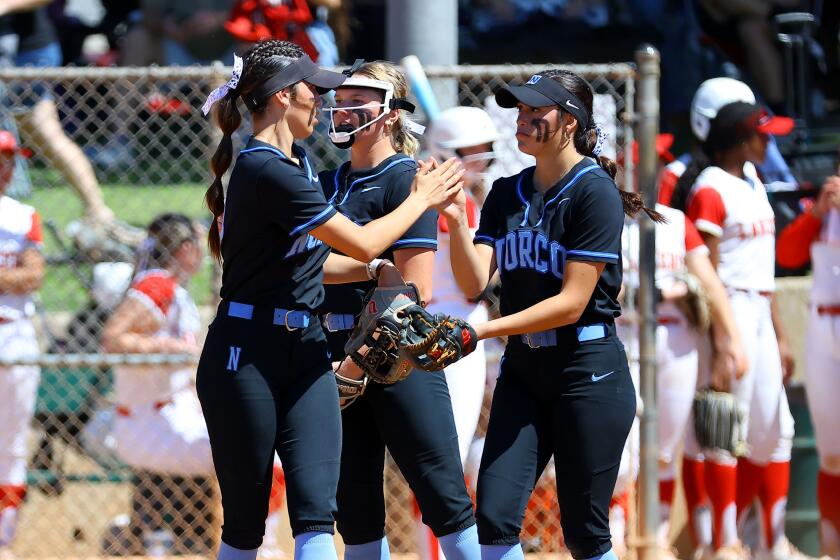A Blazing New Star Lights Tennis World
- Share via
NEW YORK — “I won!” Venus Williams exulted, 1,800 beads in her braids jiggling as she hopped in her tennis shoes at the net.
In the grandstand stood her mother, sobbing, face in hands.
The teenage daughter of Oracene Williams blew a kiss and called to her, “I won, Mom! I won!”
Momentarily grasping the hand of her opponent--who would speak unfavorably of her afterward--the 17-year-old Williams raised her arms victoriously Friday to a cheering crowd of 21,178, having just succeeded in a wildly unlikely quest to play Sunday for the U.S. Open women’s championship.
Taught to play tennis when she was 4 in her hometown of Compton, in an inner-city youth program begun by Arthur Ashe, this player who has never won any professional tournament could now win one of sport’s most coveted, at a newly dedicated stadium bearing Ashe’s name.
And, in so doing, the name Venus could become to tennis what the name Tiger has become to golf--an instantly recognizable symbol of the overnight star of a new generation.
By defeating Irina Spirlea of Romania, 7-6 (7-5), 4-6, 7-6 (9-7), in an exhausting match that took 2 hours 42 minutes, Williams qualified to play Martina Hingis of Switzerland, the No. 1 ranked player, for the title.
Players are “seeded” by a tournament committee, ranked first through 16th before the first day of play. Hingis was seeded No. 1 and is living up to it. She easily defeating sixth-seeded Lindsay Davenport of Newport Beach, 6-2, 6-4, in a semifinal match Friday that lasted only 71 minutes.
Williams, in contrast, was not seeded at all.
She came here ranked 66th in the world, never having previously reached even the quarterfinals of a pro tournament. By winning Sunday, the teenager could earn six times the money made thus far over her entire career.
Although she has lost to Hingis twice before, the supremely confident Williams said, “Doesn’t matter. I’m going to be ready.”
She is playing in the U.S. Open for the first time. Venus had to talk her father and coach, Richard Williams, into letting her enter, because of his reluctance to rush her into a career at the expense of an education and otherwise normal childhood.
Previously absent from the tournament, he was expected to attend Friday’s match but did not. His daughter declined to explain why, saying she was tired of answering the same question.
He missed a nerve-racking contest that put considerable strain on both players, physically and emotionally.
During the second set, after Williams gained an edge, 4-3, she and her Romanian opponent collided during a routine changeover as they strode to their sideline chairs.
Spirlea, 23, was livid, later saying, “She thinks she’s the f------ Venus Williams. She [sic] not going to turn.”
Williams has infuriated several rivals here with what is perceived as an aloofness, an unwillingness to be cordial, on or off the court.
Of their run-in, Williams said, “I think we just both weren’t looking. I think we were just concentrating on trying to stay in the match and trying to win the match. So, I’m sorry she feels that way. It’s not really a big thing to me.”
From that point in the match, Spirlea seemed to gain momentum. She won the second set without losing another game, and set out to become the first woman from her country to play for the U.S. championship.
“I guess I was thinking about going home,” said Williams, who grew up in California but now makes her home in Palm Beach Gardens, Fla.
“I had to push those thoughts out of the way. ‘Venus, this isn’t right. It’s not over.’ ”
The match went to the limit. A tiebreaker was needed after the third set ended in a draw, 6-6. (The U.S. Open is the only Grand Slam tournament that uses this method in a final set.)
Having to win by two points, Williams broke a 7-7 standoff when Spirlea’s shot snapped back from the top of the net. Spirlea lost match point by hitting a backhand a few inches wide to Williams’ right.
If she is unpopular with some of the players, Williams is extremely popular with the spectators here. She was mobbed by well-wishers after her victory, who encouraged her to defeat Hingis for the championship.
Though only a teenager herself, Williams is older than Hingis, 17 years 3 months to her opponent’s 16 years 11 months.
Neither would be the youngest to win this tournament, Tracy Austin having won the 1979 U.S. Open at 16 years 9 months.
Yet, with the same sudden impact that 21-year-old Tiger Woods brought to golf, Venus is in a position to become her own universe’s hottest new star.
“Other people might be surprised by this,” she said, “but I’m not.”
More to Read
Go beyond the scoreboard
Get the latest on L.A.'s teams in the daily Sports Report newsletter.
You may occasionally receive promotional content from the Los Angeles Times.










